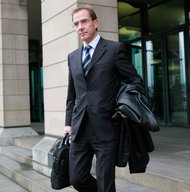 Tal Cohen/European Pressphoto AgencyMarcel Rohner, former chief of UBS, leaving a parliamentary hearing in London on Thursday. “I did the best I could,” he told lawmakers.
Tal Cohen/European Pressphoto AgencyMarcel Rohner, former chief of UBS, leaving a parliamentary hearing in London on Thursday. “I did the best I could,” he told lawmakers.
LONDON — Several former senior executives at UBS were labeled negligent and incompetent on Thursday for failing to detect illegal activity that caused the Swiss bank to pay a $1.5 billion fine to global regulators.
On the second day of hearings at the British Parliament related to the recent rate-rigging scandal, Marcel Rohner, the former chief executive of UBS, and a number of former heads of the firm’s investment bank were questioned about whether they were aware that some 40 people had altered major benchmark interest rates for financial gain.
The executives, who no longer work at the Swiss bank, denied any knowledge of the illegal activity, and said they had found out only when UBS officially confirmed in 2011 that investigations into the firm were being conducted by the Justice Department, Commodity Futures Trading Commission and international authorities.
“What we have heard are appalling mistakes that can only be described as gross negligence and incompetence,” said Andrew Tyrie, a politician who leads the Parliament’s commission on banking standards that is investigating wrongdoing at the firms operating in London. “The level of ignorance seems staggering to the point of incredulity.”
UBS agreed to pay the $1.5 billion fine in late 2012 to settle allegations that some of its traders had altered the London interbank offered rate, or Libor, and the euro interbank offered rate, or Euribor, to increase their own profits. The benchmark rates underpin trillions of dollars of financial products, including mortgages, worldwide.
Some UBS senior managers also tweaked the bank’s submissions to present the Swiss bank in a better financial position than it actually was, according to regulatory filings.
Libor Explained
Mr. Rohner, who led UBS from 2007 to 2009, a period when the bank wrote down around $50 billion of sophisticated credit products, said he was embarrassed and ashamed by the misconduct related to Libor.
“I did the best I could,” said Mr. Rohner, who appeared taken aback by the angry questions from the British politicians, who repeatedly called his actions incompetent and negligent.
Mr. Rohner said the firm’s operations had become too complex before the financial crisis and that had made it difficult to keep track of potential illegal activity by some of its employees.
The parliamentary hearing focused on speculation at the beginning of the financial crisis that highlighted banks’ so-called lowballing of rates. The practice involved submitting lower Libor numbers in an effort to portray the firms as being in strong financial health despite a severe cut in lending.
Mr. Rohner and three former chiefs of UBS’s investment bank — Huw Jenkins, Alex Wilmot-Sitwell and Jerker Johansson — all denied being aware of the rate submissions during 2007 and 2008 when the bank raised billions of dollars of new capital to bolster its own finances.
“I had the responsibility to actively seek out information about things that concerned me,” Mr. Johansson, who ran UBS’s investment bank from 2008 to 2009, told the parliamentary hearing on Thursday. “I failed to recognize this Libor issue as being one of these issues.”
Yet British politicians refused to believe that senior executives at the Swiss bank had not known about the Libor submissions at a time when the financial markets were focused on the problems of the world’s largest banks.
“You are stretching belief to its limit to get us to believe that you were completely unaware,” Andrew Love, a politician on the parliamentary committee, told the former UBS executives.
The hearing also questioned several current and former senior members of the Financial Services Authority, Britain’s financial regulator, about their actions leading to the fine against UBS, the largest financial penalty so far levied against a bank in the continuing Libor investigation.
British regulators said that only nine out of the 40 individuals involved in the UBS rate-rigging scandal had worked in the country’s financial services industry, and that authorities were continuing to investigate a number of firms and individuals.
“This is not the end of the Libor story,” said Tracey McDermott, director of enforcement and financial crime at the Financial Services Authority.
Article source: http://dealbook.nytimes.com/2013/01/10/former-ubs-executives-are-grilled-over-libor/?partner=rss&emc=rss
Speak Your Mind
You must be logged in to post a comment.